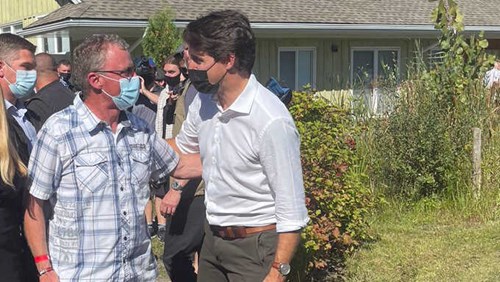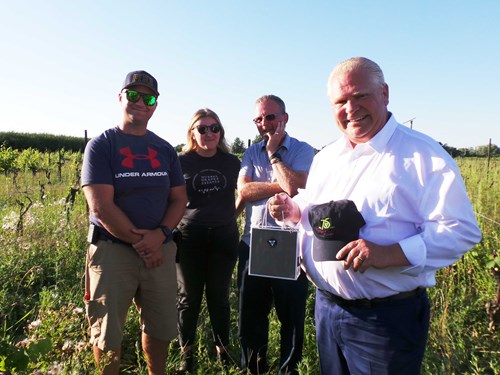In 2020, the miracle performed by the grape and wine industry was having to harvest and produce quality wines in the face of a global pandemic responsible for the deaths of thousands of Canadians and countless millions around the world. Debbie Zimmerman and staff participated in weekly adhoc government committees to help establish health and safety protocols for farm and agri-food production facilities. Pandemic travel restrictions and quarantines strained the arrival of agricultural workers. On the retail side, tourism and hospitality were shut down – no winery tours, no winery restaurants and tasting rooms, no gift shops. Various government programs partially offset these losses, but the strong winery tourism and hospitality sector that had taken decades to nurture and grow had evaporated. Decades of momentum were lost. Many wineries were able to pivot to on-line sales as consumers embraced internet shopping.
In spite of COVID-19, 2020 was a good year to grow grapes. The winter was unseasonably warm, followed by a hot and sunny summer with short regular blasts of rain; and the fall was perfect, resulting in an exceptional vintage.
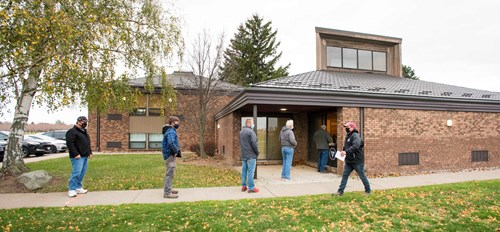
Social distancing and masking were the new norm in 2020 with grape cheques picked up outside the GGO office.
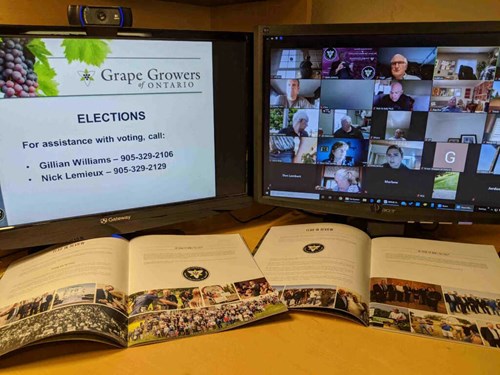
GGO held the Annual General Meeting virtually by video conference.
In business terms, the GGO was able to negotiate an overall price increase of 1% for the 2020 crop, but even this relatively normal development was impacted by the pandemic, as negotiations now took place virtually. At every level, the pandemic’s risks and dangers altered the usual course of business. The GGO board met virtually, the GGO’s full time staff all worked from home, and all promotional events – including the annual Grape and Wine Festival and the Annual Celebrity luncheon that launched it, were cancelled.
A partial agreement was reached between the industry and the federal government on Australia’s World Trade Organization challenge. GGO along with OCW continued to press for replacement programs both federally and provincially that help build on the reputation of the Canadian wine industry. Wine Growers Ontario pressured growers to sign on to their proposal that would extend the benefit to IDB wine. Growers continue to be concerned that government policy should focus on supporting local grape production and authentic Canadian wines.
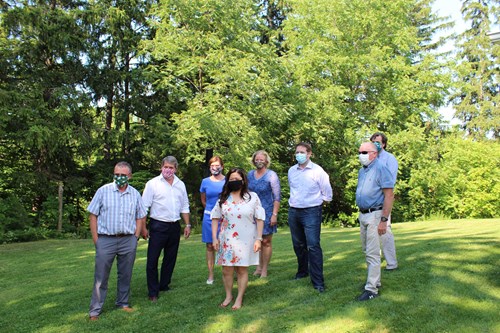
Honourable Mary Ng, Minister of International Trade, Export Promotion, Small Business and Economic Development met with Matthias Oppenlaender, MP Vance Badawey, Debbie Zimmerman, Carolyn Hurst Chair Ontario Craft Wineries, MP Chris Bittle, Bill Schenck and Richard Linley President Ontario Craft Wineries.
“I know what my colleagues in Europe, they’re on their own. They don’t have half the support from government that we have. That speaks to the strength of our organizations, whether it’s the Grape Growers of Ontario or the other organizations that represent the horticulture sector and agriculture, in Ontario and in Canada. Just building on this, obviously, I’m proud to pick up on the legacy from John and Ray and Bill, we have grown the industry. We are still growing it and I’m really proud of that. Despite all the challenges and the issues in the industry, the growers are still trusting this organization, are still knowing this is the way we need to keep on going to promote and protect the grape growers of Ontario.” - Matthias Oppenlaender
2020 also saw GGO launch a new, real time weather network to replace the previous aging weather stations. It included 49 weather stations that refresh their data every minute.
The Clean Plant Extraction Sequencing Diagnostics project (known as CLEANSED) led by CGCN received $6.35 million in federal funding to commercialize high-throughput sequencing for the certification of virus-tested propagation material.
GGO and OCW worked together to simplify sustainability certification, incorporating it fully into eGrape, and provide clear direction for both sustainable wine making and grape growing.
An agreement with Australia regarding their WTO challenge was announced with the elimination of the federal excise duty exemption on wine made of 100% Canadian grapes by June 30, 2022. The number of VQA wineries in Ontario had grown from 86 to 183 since the exemption was introduced in 2006 – wineries that have operated without being subjected to the excise duty. Wine, including cider, relieved of excise duty in Ontario had grown from 14.4 million litres in 2007, the first full year of the exemption, to 95.1 million litres in 2019. The exemption had been a significant driver of growth of the domestic industry.
In Provincial terms the WTO challenge changed the definition of small winery upward; reduced dedicated shelf space in grocery stores; eliminated grocery stores restricted to small wineries and quality assurance wine; and eliminated the difference in basic tax charged on 100% Ontario versus International Domestic Blend wine sold in off-site winery retail stores within three years of the agreement (June 2023). This last point is referred to as tax harmonization and the GGO is concerned that this change needs to be neutral in terms of its impact on VQA and 100% Ontario wine
A highlight in the GGO’s ongoing community involvement and support was its donation of $66,000 to the Niagara Health Foundation to assist in the purchase of essential ventilators for patients stricken with COVID-19, and a social media challenge to others to do the same.
In other newsworthy developments, two esteemed members of the grape growing community, John Peller and Len Pennachetti, were named members of the Order of Canada for their outstanding contributions to the grape and wine industry; and GGO CEO, Debbie Zimmerman, was awarded an Honorary Doctor of Laws from Brock University.
2020 was a year like no other. Grape growing has always been dependent on the contributions and cooperation of mother nature, but in 2020 the natural world tossed a lethal pandemic into the mix, illustrating that while frosts and droughts can seem like catastrophes, she has much more powerful tools at hand should she choose to use them.




